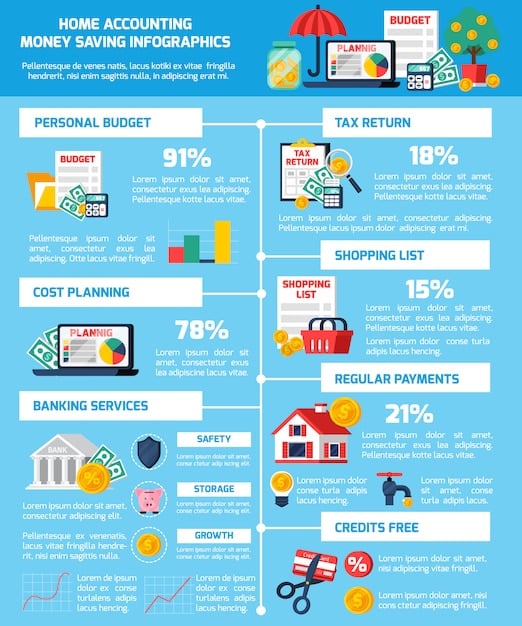Navigate Updated US Tax Laws: A Small Business Guide

Anúncios
Navigating the updated US tax laws for small businesses can be complex, but understanding key changes, available deductions, and compliance requirements is crucial for financial health and growth; this guide provides essential insights.
The US tax landscape is constantly evolving, and staying on top of the changes is essential for small business owners. Failing to comply with the latest regulations can lead to penalties and missed opportunities. This guide will help you navigate the updated US tax laws for small businesses, ensuring you’re prepared for success.
Anúncios
Understanding recent changes in US tax laws for small businesses
Recent years have brought significant changes to US tax laws, impacting small businesses in various ways. From revisions to deductions and credits to new compliance requirements, it’s crucial to stay informed to optimize your tax strategy.
Key Provisions of the Tax Cuts and Jobs Act (TCJA)
The Tax Cuts and Jobs Act (TCJA) introduced several changes that continue to affect small businesses. Some of the most notable provisions include adjustments to the corporate tax rate and changes to deductions for pass-through entities.
Anúncios
Impact of the Inflation Reduction Act on Small Businesses
The Inflation Reduction Act includes provisions that impact small businesses, particularly in the areas of clean energy and healthcare. Understanding these changes can help businesses take advantage of new incentives and credits.
- Clean Energy Tax Credits: Incentives for investing in renewable energy sources.
- Healthcare Tax Credits: Subsidies for providing health insurance to employees.
- Increased IRS Funding: Enhanced enforcement and compliance measures.
Keeping abreast of these legislative changes is crucial for making informed financial decisions. Consult with a tax professional to understand how these updates specifically affect your business.
Identifying applicable tax forms and deadlines
Choosing the correct tax forms and adhering to deadlines are critical aspects of tax compliance for small businesses. Understanding which forms apply to your business structure and when they are due can prevent penalties and ensure a smooth tax filing experience.
Common Tax Forms for Small Businesses
The tax forms required for your small business depend on its legal structure. Here are some of the most common forms:
- Form 1040 Schedule C: Used by sole proprietors to report business income and expenses.
- Form 1065: Used by partnerships to report income, gains, losses, deductions, and credits.
- Form 1120: Used by corporations to report income, deductions, and credits.
- Form 1120-S: Used by S corporations to report income, deductions, and credits.
Key Tax Deadlines to Remember
Missing tax deadlines can result in penalties and interest charges. Here are some important deadlines to keep in mind:
- January 31: Deadline for issuing W-2 and 1099 forms to employees and contractors.
- March 15: Deadline for filing partnership and S corporation tax returns (Form 1065 and Form 1120-S).
- April 15: Deadline for filing individual income tax returns (Form 1040) and C corporation tax returns (Form 1120).
- Estimated Tax Payments: Quarterly deadlines for paying estimated taxes to avoid underpayment penalties.
Organizing your tax documents and setting reminders for these deadlines can help you stay on track and avoid costly mistakes. Consider using tax software or working with a tax professional to manage your tax obligations effectively.
Maximizing deductions legally available to small businesses
Small businesses can significantly reduce their tax liability by taking advantage of all eligible deductions. Understanding which deductions are available and how to claim them can result in substantial tax savings.
Common Business Expenses That Are Tax Deductible
Many ordinary and necessary business expenses can be deducted from your taxable income. Some common examples include:
- Home Office Deduction: For using a portion of your home exclusively for business purposes.
- Vehicle Expenses: For business use of a vehicle, either by deducting actual expenses or taking the standard mileage rate.
- Business Travel: For expenses related to business trips, including transportation, lodging, and meals.
- Supplies and Equipment: For the cost of materials and equipment used in your business.
Strategies for Claiming Valid Deductions
Proper documentation is key to claiming valid deductions. Here are some strategies to follow:
- Keep Detailed Records: Maintain receipts, invoices, and other documentation for all business expenses.
- Track Mileage: Use a mileage log or app to record business-related mileage.
- Consult with a Tax Professional: Get personalized advice on which deductions apply to your specific business situation.
By keeping accurate records and staying informed about available deductions, small businesses can optimize their tax strategy and reduce their overall tax burden. Remember to consult with a tax professional to ensure you are claiming all eligible deductions legally and accurately.
Navigating changes to depreciation rules and asset expensing
Depreciation and asset expensing are important considerations for small businesses that invest in equipment and other assets. Understanding the rules and changes related to these areas can help businesses make informed decisions about capital investments.
Understanding Depreciation Methods
Depreciation is the process of deducting the cost of an asset over its useful life. There are several methods available, including:
- Straight-Line Depreciation: Deducts an equal amount of the asset’s cost each year.
- Accelerated Depreciation: Allows for larger deductions in the early years of the asset’s life.
Section 179 Expensing
Section 179 of the IRS code allows businesses to deduct the full purchase price of qualifying assets in the year they are placed in service, up to certain limits. This can be a valuable tool for small businesses looking to reduce their tax liability.
Staying informed about changes to depreciation rules and Section 179 expensing can help small businesses make strategic decisions about asset investments and tax planning.
Utilizing available tax credits and incentives
Tax credits and incentives can provide significant financial benefits for small businesses. Understanding which credits are available and how to qualify for them can help businesses reduce their tax bill and invest in growth.
Common Tax Credits for Small Businesses
Several tax credits are available to small businesses, including:
- Research and Development (R&D) Tax Credit: For businesses that invest in qualifying research and development activities.
- Work Opportunity Tax Credit (WOTC): For hiring individuals from certain targeted groups.
- Employee Retention Credit (ERC): A refundable tax credit for businesses that continued paying employees during the COVID-19 pandemic (subject to specific eligibility requirements).
How to Claim Tax Credits and Incentives
Claiming tax credits and incentives typically involves completing specific forms and providing supporting documentation. Consult with a tax professional to ensure you meet all eligibility requirements and properly claim the credits.
Staying informed about available tax credits and incentives can help small businesses reduce their tax liability and invest in activities that promote growth and innovation. Be sure to review the latest IRS guidance and consult with a tax professional to maximize your benefits.
Best practices for tax planning and compliance for the upcoming year
Effective tax planning is essential for optimizing your tax strategy and ensuring compliance with US tax laws. By implementing best practices and staying organized, small businesses can minimize their tax burden and avoid costly penalties.
Developing a Proactive Tax Strategy
Proactive tax planning involves anticipating tax liabilities and making strategic decisions to minimize your tax burden. Some key strategies include:
- Regularly Review Your Financial Situation: Monitor your income and expenses to identify opportunities for tax savings.
- Consider Tax-Advantaged Investments: Invest in retirement plans and other tax-deferred accounts to reduce your taxable income.
- Plan for Major Transactions: Consult with a tax professional before making significant financial decisions, such as buying or selling assets.
Maintaining Accurate Records
Accurate record-keeping is essential for tax compliance. Keep detailed records of all income, expenses, and other financial transactions. Use accounting software or work with a bookkeeper to maintain organized records.
By implementing these best practices and staying informed about changes to US tax laws, small businesses can navigate the complexities of the tax system and optimize their financial outcomes. Regular consultation with a tax professional is highly recommended to ensure you are taking full advantage of available opportunities and complying with all relevant regulations.
| Key Point | Brief Description |
|---|---|
| 📝 Tax Law Updates | Stay informed about recent and upcoming changes. |
| ✅ Deductions | Maximize eligible deductions to reduce tax liability. |
| 📅 Deadlines | Meet all filing and payment deadlines to avoid penalties. |
| 💰 Credits | Utilize available tax credits to lower your tax bill. |
Frequently Asked Questions
▼
Recent changes include updates to the standard deduction, modifications to business expense deductions, and new credits for specific industries or activities. Check the IRS website for up-to-date information.
▼
The tax forms you need depend on your business structure (e.g., sole proprietorship, partnership, corporation). The IRS offers guides and tools to help determine the appropriate forms based on your specific circumstances.
▼
Commonly overlooked deductions include home office expenses, vehicle expenses, startup costs, and contributions to retirement plans such as SEP or SIMPLE IRAs. Keep detailed records to claim all eligible deductions.
▼
To ensure compliance, maintain accurate records, file taxes on time, pay estimated taxes quarterly if required, and stay informed about changes to tax laws. Consider consulting with a tax professional for personalized guidance.
▼
Research available tax credits and incentives relevant to your industry, such as credits for hiring veterans or investing in renewable energy. Maintain thorough documentation to support your claims, and consult with a tax advisor.
Conclusion
Staying informed about the latest US tax laws and implementing effective tax strategies are crucial for the financial health of your small business. By understanding recent changes, maximizing deductions, and ensuring compliance, you can navigate the complex tax landscape and position your business for success. Remember to consult with a tax professional for personalized guidance and to stay on top of any new developments in tax regulations.







